An interview with Faith Doherty.
The European parliament made a historical move today when it voted overwhelmingly to ban illegal timber from its markets. For activists worldwide the ban on illegal timber in the EU is a reason to celebrate, but for one activist, Faith Doherty of the Environmental Investigation Agency (EIA), the move has special resonance.
In early 2000, Doherty and an Indonesian colleague were kidnapped, beaten, and threatened with a gun by illegal loggers in Indonesian Borneo.
“My colleague sustained injuries to his face and bruising to his body, while my fingers were broken on my right hand,” Doherty told mongabay.com.
Doherty and her colleague had taken footage of a massive timber operation by the company Tanjung Lingga. The corrupt company had been illegally felling trees in Tanjung Puting National Park.
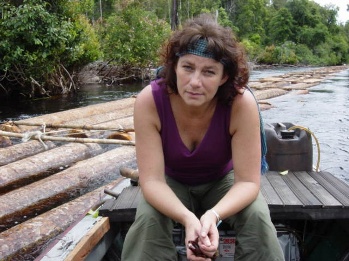 Doherty in Kalimantan, Indonesian Borneo. Photo courtesy of Faith Doherty. |
After being beat by the illegal loggers, the police were called in. However, they came not to arrest the illegal loggers, but for Doherty and her companion.
“We were held in this police station for three days while negotiations continued between the Head of Police in Jakarta and Regional police, the UK Embassy, the US Embassy, many NGOs and the Dayak leaders of Central Kalimantan. While this was going on we were subjected to a mob of men posted outside the police station and at times outside the window of the room we were being held in with machetes, sticks and verbal abuse for the entire three days,” Doherty says, adding that “these men were paid by Tanjung Lingga.”
Doherty’s nightmare ended when policemen helped her and her companion escape.
After escaping, Doherty was able to present her findings to The World Bank and the new Indonesian government.
“The major issue we were able to get across was that of how corruption was the root cause of illegal logging in Indonesia and that the billion dollar timber industry had been getting away in supplying illegally harvested timber to global markets for a long long time. Something had to change.”
Rather than dampen her resolve, her terrifying experience only made Doherty more passionate about working to halt illegal logging, a practice which hurts people as much as it does species and forests.
“Violence in the forest is common, and forest dependant communities are threatened by so many different players. I wanted to use what happened to me to highlight the complexities of illegal logging,” Doherty says.
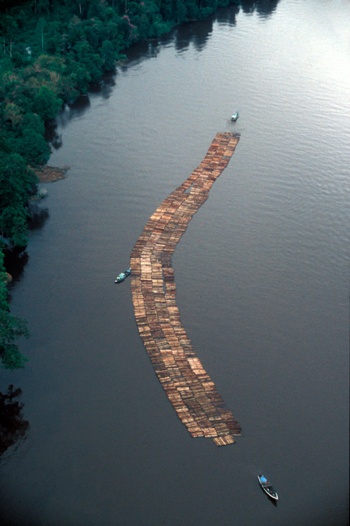 Log raft in Indonesia. Photo courtesy of Faith Doherty. |
While the vote today is a move forward, Doherty says that it is only the beginning.
“The actual law itself could be stronger by extending the prohibition to all players that sell timber and wood products in Europe; but for the moment what we have is a prohibition that addresses those that first place timber and wood products into the market. But, this is a first step and we’re going to build on it,” she explains.
Doherty explains that she has already seen changes on the ground after the US amended the Lacey Act in 2008 to include outlawing the sale of illegal timber or timber products.
“With two laws now in place in the two largest consuming markets for timber products there is bound to be a change,” she says of the EU joining the US in banning illegal timber. She hopes Australia will be next.
Still, according to Doherty, the battle is far from won.
“We still have major challenges. Russia is not part of any agreement nor is China, two major exporters. But, the law will help us to ensure enforcement takes place when illegality is proven and help close the illegal trade.”
In a July 2010 interview with mongabay.com, Faith Doherty tells of her harrowing experience at the mercy of illegal loggers in Indonesia, the new EU law, and the future of the fight against illegal logging.
AN INTERVIEW WITH FAITH DOHERTY
Mongabay: Can you tell us about what happened when you were kidnapped in Indonesia by logger barons?
Faith Doherty: In August 1999, EIA and our Indonesian partners Telapak released a report called The Final Cut (See our website www.eia-international.org) which exposed illegal logging in Tanjung Puting National Park and named both the company (Tanjung Lingga) and Central Kalimantan’s timber baron Abdul Rasyid as being behind the logging.
In early 2000, my Indonesian colleague and I returned to the Park to monitor the situation and see if the authorities had done anything to stop this blatant abuse of the law. Our findings were to be used at a World Bank meeting with the Indonesian government as part of the Consultative Group of Indonesia. (CGI)
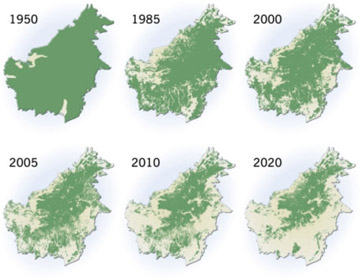 Figure 1: Extent of Deforestation in Borneo 1950-2005, Projection to 2020. The island of Borneo is split between Malaysia, Indonesia, and Brunei. |
We managed to find a massive sawmill and warehouse that had thousands of cubic meters of Ramin, a timber only found in the national park. Ramin is used for picture frames, snooker cues, baby cribs and futon frames. After filming our findings we returned to our hotel. We received a phone call from reception to tell us some men had come from Tanjung Lingga and wanted us to go with them to meet Abdul Rasyid to discuss our findings. We had no choice and were taken into a car, doors locked and driven to the Tanjung Lingga office. Once inside the office we were met by Sugianto, the nephew of Abdul Rasyid and for the next few hours, beaten, shouted at and threatened with a pistol. My colleague sustained injuries to his face and bruising to his body, while my fingers were broken on my right hand. The police were called and were told we had broken into their offices and should be arrested. We were taken to the police station and questioned.
We were held in this police station for three days while negotiations continued between the Head of Police in Jakarta and Regional police, the UK Embassy, the US Embassy, many NGOs and the Dayak leaders of Central Kalimantan. While this was going on we were subjected to a mob of men posted outside the police station and at times outside the window of the room we were being held in with machetes, sticks and verbal abuse for the entire three days. These men were paid by Tanjung Lingga.
After one day, three of Tanjung Lingga’s executives came to see us at the police station including their lawyer. They wanted me to go on television and retract all the information we had written about them and their role in the destruction of the National Park, and threats to the orangutan. I told them that I couldn’t do that without the permission of my board of directors at EIA, who were on holiday at that time. We managed to stall this process for a while, so that we could give time to those fighting for our release.
After 3 days both of us managed to get out of Pangkalanbun, the small town closest to Tanjung Putting National Park but only due to some brave policemen and efforts of many people including EIA and Telapak. But even after we had escaped, Sugianto and Rasyid’s men followed us to Jakarta and we had to find a safe house to stay in for a while so that we could work on getting the information we had found out in to the public domain.
A week later, we were able to give our information over to the authorities, and present our findings to both the World Bank and the new Indonesian Government at the CGI. With attention on what had happened to us, we were able to ensure this issue became more than just a footnote in a very big meeting addressing the many issues Indonesia was facing at the time. The major issue we were able to get across was that of how corruption was the root cause of illegal logging in Indonesia and that the billion dollar timber industry had been getting away in supplying illegally harvested timber to global markets for a long long time. Something had to change.
Mongabay: How did you stay committed to fighting deforestation after such an experience?
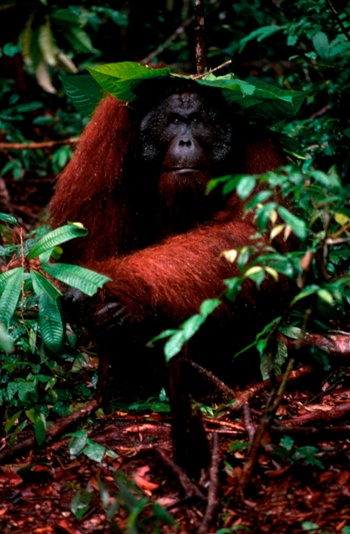 An adult orangutan in Indonesia. While orangutans have become the symbol of forest destruction in Indonesia and Malaysia, thousands of species are threatened by the forest loss. Photo courtesy of Faith Doherty. |
Faith Doherty: I was determined after getting away with my life that no one should have to live with that kind of threat. Having lived and worked in SE Asia for most of my life I was not naive to think that I was the only one this had happened to. Violence in the forest is common, and forest dependant communities are threatened by so many different players. I wanted to use what happened to me to highlight the complexities of illegal logging.
I also knew that we had a role to play in bringing a legislative approach to this issue because of the way EIA works. After being on the ground and staying focused in exposing not just illegal logging but also the illegal trade in timber and wood products, we were in a unique position of really understanding how the criminals involved worked. Both EIA and Telapak worked very hard in difficult circumstances by exposing the truth but also creating opportunities for dialogue. Together with Indonesian civil society we approached not just the Indonesian government but also the decision makers in Europe.
Missions were planned, meetings arranged and slowly solutions were created through dialogue between those that actually lived in Indonesia and those who were tasked to come up with a response from Europe. We spent a long time building a relationship with the Indonesian government and creating a political space for both Indonesian stakeholders and consumers in Europe. We knew that the best way to move forward was to ensure this issue was addressed both ends, the producer country in this case Indonesia and the consuming market in this case Europe.
Mongabay: What does the EU illegal timber ban mean for you?
Faith Doherty: This is a very important piece of legislation. It’s the first regulation we have that addresses the illegal trade and illegality of timber and wood products entering into the European market. By having this law Europe is taking some responsibility that has driven the demand for cheap tropical timber.
The actual law itself could be stronger by extending the prohibition to all players that sell timber and wood products in Europe; but for the moment what we have is a prohibition that addresses those that first place timber and wood products into the market. But, this is a first step and we’re going to build on it. What we need to focus on now is ensuring that issues such as penalties which are the responsibility of member states are very strong. After all this law is only as strong as its weakest point. But finally we have something we can use when we know illegality has occurred, which was what we wanted.
Mongabay: How do you think it will practically impact the illegal timber trade worldwide?
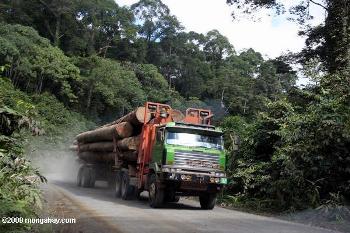 Truck carrying logs out of a Malaysian rainforest. Illegal logging is rife in many parts of the world including Asia, Africa, and South America. Photo by: Rhett A. Butler. |
Faith Doherty: While this is the first regulation we have that tackles illegality in the timber trade for Europe this is not the only law that exists. In the United States EIA campaigned to have a law used by the US authorities to combat the illegal trade in wildlife amended to include timber and wood products. On May 22nd, 2008 the Lacey Act was finally amended and now includes illegally sourced plants and their products (this includes timber and wood products.)
We have already seen some major changes to the way some of the traders now supply to their markets. With two laws now in place in the two largest consuming markets for timber products there is bound to be a change. Secondly, the EU as part of its action plan to tackle illegal logging has been working with some producer countries to develop new legality systems, resource capacity building, and work for more transparency to create secure controls and verifiable tracking systems of the supply chain.
All of these steps are good and have already made some difference to the chaos that existed 10 years ago. Further, forest governance is also part of any solution and the role that civil society plays absolutely crucial. They are the ears and eyes of the forest. But, we still have major challenges. Russia is not part of any agreement nor is China, two major exporters. But, the law will help us to ensure enforcement takes place when illegality is proven and help close the illegal trade.
Mongabay: What other steps would you like to see taken to stop deforestation?
Faith Doherty: From consuming countries we have to deal with the issues that drive deforestation nationally and internationally. It would take me all day to answer this question fully so I am going to address the next steps for EIA.
The two laws that exist in the EU and US need to extend to the global markets and a good step towards that would be for Australia to step up and bring in legislation. They have been too slow in responding to the need to clean up their markets. ASEAN needs to be a lot more pro-active and to include civil society participation in any solution, and they need to start looking at forest governance more seriously. Foreign Trade Agreement’s (FTA) negotiated must include timber regulations and should take into account the environment.
And finally, ensuring the livelihood of indigenous forest communities and their safety is the responsibility of every government whether they are a consuming country or not. Threats to the forest and those that depend on them are now so enormous without safeguards the international community will be responsible for the loss of more than just a void natural resources to fill their markets.
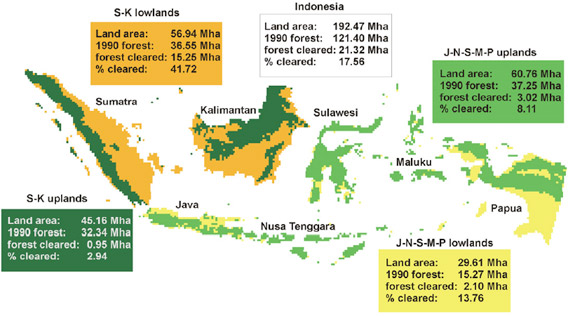
Estimates of national and sub-national forest cover extent and loss. S-K stands for the combined Sumatra and Kalimantan island
groups. J-N-S-M-P stands for the combined Java, Nusa Tenggara, Sulawesi, Maluku and Papua island groups. Image courtesy of Hansen et. al. 2009.
Related articles
Europe bars illegal timber from markets

(07/07/2010) The European Parliament today voted overwhelming to bar illegally logged timber from E.U. markets. The legislation, which passed 644-25, will require all companies selling timber products in the E.U. to prove their wood is legally sourced. Companies that fail to demonstrate credible sourcing practices will be subject to fines. The rules will go into effect in 2012, but paper products will be exempted for five years.
The illegal logging cycle in Madagascar
(06/23/2010) The latest issue of the journal Madagascar Conservation & Development provides a comprehensive look into Madagascar’s illegal logging trade, which has generated more than $200 million for a small group of individuals over the past year. The trade, which spikes just prior to national elections and may be a source of funds for ruling politicians, has taken a heavy toll on the lowland rainforests of Madagascar, with targeted species now at risk of extinction.
Massive forest loss spurs Nepal to ban logging for two months
(06/23/2010) Nepal has announced a two month ban on logging throughout the mountainous country, reports the AFP. The ban was issued after officials received reports of alarming deforestation in lowland areas; according to one official over 100,000 hectares (250,000 acres) of forest was lost in a few months, more forest than was lost from 2000-2005.
(06/07/2010) On May 15th the West African nation of Gabon implemented a total ban on log exports. According to the International Timber Trade Organization (ITTO) the ban has been efficiently enforced to date and log exports from Gabon have “completely halted”.
International alliance created to help corporations avoid illegal wood
(06/01/2010) Given the complexities of the global wood trade and the difficulty of deciphering a product’s source of wood, the World Resources Institute (WRI), the Environmental Investigation Agency (EIA-US and the US Agency for International Development (USAID) have banded together to create a global initiative, the Forest Legality Alliance, to aid private corporations to reduce the trade in illegal wood. The alliance’s formation comes after the US amended the Lacey Act in 2008 to ban the trade of illegal wood products in the US.
Cameroon agrees to cut illegal wood out of its supply chain
(05/10/2010) One of Africa’s largest exporters of tropical hardwoods, Cameroon, has announced today a trade agreement with the European Union (EU) to rid all illegal wood from its supply chain to the EU and worldwide. Cameroon signed a legally-binding Voluntary Partnership Agreement (VPA) that will cover all wood products produced in Cameroon.
New timber ban failing to stop illegal logging in Madagascar
(04/04/2010) Rainforest timber continues to be cut illegally from Madagascar’s national parks despite a recently announced moratorium on precious wood exports and logging, reports a source from the Indian Ocean island nation.
Thousands of tons of illegal timber in Madagascar readied for export
(03/13/2010) As the President of France, Nicholas Sarkozy, argues in Paris that more funding is needed to stop deforestation and mitigate climate change, a shipment of illegal rosewood is being readied for export in Madagascar by a French company with the tacit approval of the French government.
Illegal loggers hit community reforestation project in Indonesia, spurring questions about REDD
(02/22/2010) Illegal loggers are targeting community-managed forests in South Sumatra, renewing questions over forestry governance and law enforcement as the Indonesia prepares to capitalize on payments for conservation and reforestation under a proposed climate change mitigation mechanism known as REDD, reports the Jakarta Press.
Illegal logging rampant in Peru
(02/15/2010) A survey of 78 forestry concessions in Peru found that 46 (59 percent) were in breach of their concession contracts, reports the International Tropical Timber Organization (ITTO).
How to end Madagascar’s logging crisis

(02/10/2010) In the aftermath of a military coup last March, Madagascar’s rainforests have been pillaged for precious hardwoods, including rosewood and ebonies. Tens of thousands of hectares have been affected, including some of the island’s most biologically-diverse national parks: Marojejy, Masoala, and Makira. Illegal logging has also spurred the rise of a commercial bushmeat trade. Hunters are now slaughtering rare and gentle lemurs for restaurants.
Asia’s biggest logging company accused of bribery, violence in Papua New Guinea
(02/08/2010) A local organization in Papua New Guinea, known as Asples Madang, is fighting against one of the region’s biggest industrial loggers, Rimbunan Hijau (RH) chaired by billionare Tiong Hiew King. Aspeles Madang has accused Malaysian company, RH, of acquiring land illegally and of using brute force and bribery in its dealing with locals.
